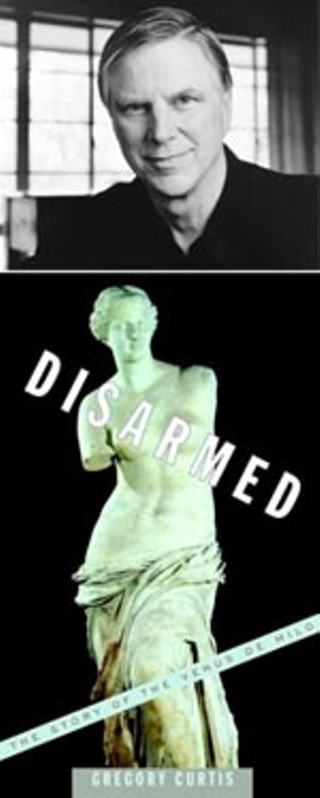The Rebirth of Venus
Greg Curtis' 'Disarmed' gets the elusive skinny on the sculpture whose stomach is 'Immense Like the Sea'
By Roger Gathman, Fri., Oct. 24, 2003

Of the two famous ladies of the Louvre, one -- Mona Lisa -- has inspired the Nat King Cole song, numerous books and monographs, and one of the most famous examples of Victorian prose, Walter Pater's rapturous description of her as "older than the rocks among which she sits; like the vampire, she has been dead many times, and learned the secrets of the grave; and has been a diver in deep seas, and keeps their fallen day about her; and trafficked for strange webs with Eastern merchants." The second, Venus de Milo, has generated far fewer monographs and far less rapture, even though the simple mention of her name evokes her image. At best, Rodin said that her stomach is "immense like the sea," which isn't exactly Nat King Cole. It isn't even Walter Pater.
Gregory Curtis' delightful book, Disarmed: The Story of the Venus de Milo (Knopf, $24), plugs this gap. Curtis traces the statue of the goddess from her discovery on the island of Melos in 1820 during an amateur dig (an excavation that has accreted with many dramatic legends over the years); the story of her placement and partial reconstruction in the Louvre; and, finally, the tug of war between German and French scholars about her dating, her creator, and ultimately her value. It is an unexpected topic for a first book by Curtis, who, after 19 years of editing Texas Monthly, retired in 2000. Before editing the Monthly, he was part of the founding staff, recruited "by my Rice roommate, Bill Broyles, in 1973." We talked to Curtis over the phone about journalism, scholarship, and authenticity.
Austin Chronicle: You did a piece, in the Seventies, about a man who was trying to discover the first blues singers in Texas. And you did another piece about a man who was forging Texas historical documents. Do you think the dialectic between authenticity and its exploitation, which you feel in those pieces, carries over to your book?
Gregory Curtis: I've always been interested in forgery and fraud. Even now, when I'm in a gallery or go to an auction, I'm very skeptical, because there is a lot of forgery out there, especially in antiquities, in Meso-American artifacts, and African art, etc. There's a phrase in journalism -- too good to check -- and I think that is all too often the rule. The Venus de Milo isn't a forgery, but what is it? And you have to realize that all we have left of the art of antiquity -- all of the statues of the great masters -- Praxiteles, Myron, Phidias -- are written descriptions. We don't have a single one left --
AC: -- like the first blues singers.
GC: Sort of. Now, the strange thing is that the story of the Venus de Milo doesn't exist outside my book. I had to find it; I had to research it, and put the narrative together, because nobody had done that before. That means asking why -- why was this letter written, why was Quatremere [the French scholar who wrote the first paper on the statue, in 1821, dating it to the fourth century BC] the person the Louvre got to write this paper. I really enjoyed that part, getting to know these people. In journalism, the people you write about are alive, or at least you can see them in photographs and films. I'd interview someone and get an impression of them -- are they distressed, are they rude. But in this case, not only were the chief figures dead, I couldn't even talk to anybody who had talked to them. It was a different thing, meeting someone on paper. ![]()










